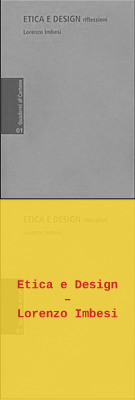 Lorenzo Imbesi is Associate Professor of Industrial Design at Sapienza University of Rome (Italy) and he was a Faculty heading the Master of Design MDes at Carleton University in Canada until 2013. Architect, PhD in Design, ICCS fellow – Canada Government and member of the Research Board of Italian and European researches. He is speaker as keynote and coordinator for international conferences and curator of design exhibitions and events. Critic and essayist for many reviews, he has been Co-Director of “DIID – Disegno Industriale”. At the moment he is directing: ‘Design Principles and Practices: an International Journal’ (Common Ground Publishing, Chicago), ‘FIELDS. An Interdisciplinary Design Journal’ (Carleton University, Ottawa) and he is a member of the editorial board of “The Design Journal” (Bloomsbury Publishing, London).
Lorenzo Imbesi is Associate Professor of Industrial Design at Sapienza University of Rome (Italy) and he was a Faculty heading the Master of Design MDes at Carleton University in Canada until 2013. Architect, PhD in Design, ICCS fellow – Canada Government and member of the Research Board of Italian and European researches. He is speaker as keynote and coordinator for international conferences and curator of design exhibitions and events. Critic and essayist for many reviews, he has been Co-Director of “DIID – Disegno Industriale”. At the moment he is directing: ‘Design Principles and Practices: an International Journal’ (Common Ground Publishing, Chicago), ‘FIELDS. An Interdisciplinary Design Journal’ (Carleton University, Ottawa) and he is a member of the editorial board of “The Design Journal” (Bloomsbury Publishing, London).DESIGNING FOR A POST-INDUSTRIAL SOCIETY: Collective Intelligence, Social Innovation and New Technologies
Industry is living an historical shift of its role in society and production through the admittance of the new technologies. Along the crisis of industry, knowledge and creativity come to be a primary force capable of generating value and innovation. The new technological revolution is questioning the way we produce, manufacture, distribute and fund everything, from small to big objects we deal with in our everyday lives. The process of digitalization is opening new challenges but also opportunities for rethinking what and the way we produce towards a society which is more environmentally sustainable, socially equitable and democratic.
The new generations of designers have come to terms with deindustrialization, while experiencing a special space for self-organization and then revealing new open and collaborative forms of production. The outcome from such collective and grassrooted activity is social innovation, which is mobilizing an ubiquitous collective and creative intelligence directed towards the solution to real, local and social problems.
SUGGESTED BOOKS
Interesting questions / statements
What is the relationship between collective intelligence and the design action?
What is the role of the Designer in a society where everybody design?
What are the opportunities for social innovation and sustainability along with the emergence of new technologies and the change in industry?


